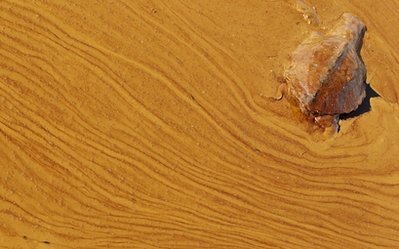-
News >World
BP plans to replace containment cap next month
2010-06-08 07:20
A dead turtle floats on a pool of oil from the Deepwater Horizon spill in Barataria Bay off the coast of Louisiana Monday, June, 7, 2010. [Agencies]
NEW ORLEANS?- As officials reported a gradual increase in the amount of oil being captured from the spewing wellhead at the bottom of the Gulf of Mexico, BP PLC said Monday that it plans next month to replace the cap collecting the crude with a slightly bigger device.
The newer cap will "provide a better, tighter fit" than the current one collecting roughly one-third to three-fourths of the oil gushing daily from the sea floor, company spokesman Robert Wine said. But it will also allow the oil now being collected to again spew out into the Gulf during the changeover.The oil began gushing after a BP oil rig explosion April 20 and recently increased in volume after officials sheared off the top of the damaged outflow pipe as part of the latest containment effort. BP believes the bigger cap will fit over more of the pipe than the current cap.
The current device is collecting about 466,200 gallons of oil per day, Coast Guard Adm. Thad Allen, the government's point man for the oil spill response, said earlier Monday at the White House. He also elaborated on comments made over the weekend that the spill cleanup would last into fall, acknowledging the full process would take much longer.
"Dealing with the oil spill on the surface will take a couple of months," he said Monday, but the process of getting oil out of marshlands and other habitats "will be years."
The battle against the oil already in the Gulf now involves "hundreds or thousands" of individual patches, Allen said. Small vessels in the area have been enlisted to help capture those patches using skimmers.
The patchy oil slick from the ruptured pipe off Louisiana has stained beaches and marshes in spots along more than 100 miles of coast from Louisiana to the Florida Panhandle, and a sheen on the surface was spotted as far as about 150 miles west of Tampa, Fla.
Tar balls continued to roll onto shore Monday morning farther west at Pensacola Beach, Fla., leaving a line in the sand visible from the high-rise condos above as the sun rose. Beach walkers had to stay between the line of dime- and quarter-size tar balls and the retreating surf or risk getting the gummy, rust-staining gunk stuck to their feet.
Jody Haas, a tourist from Aurora, Ill., was among the few walking the beach early Monday after a crowded weekend here. Haas, who had visited the beach before, said it was not the same.
"It was pristine, gorgeous, white sand," she said. "This spot is light compared to some of the other spots farther down and (the tar) is just everywhere here. It's just devastating, awful."
At Barataria Bay, La., just west of the mouth of the Mississippi River, large patches of oil the consistency of pancake batter in the still waters Monday. A dead sea turtle caked in brownish-red oil lay splayed out with dragonflies buzzing by.
The Barataria estuary, which has become one of the hardest-hit areas, was busy with shrimp boats skimming up oil and officials in boats and helicopters patrolling the islands and bays to assess the state of wildlife and the movement of oil.
On remote islands, oil visibly tainted pelicans, gulls, terns and herons.
President Barack Obama sought to reassure Americans on Monday by saying that "we will get through this crisis" but that it would take dedication.
"This will be contained," Obama said. "It may take some time, and it's going to take a whole lot of effort. There is going to be damage done to the Gulf Coast, and there is going to be economic damages that we've got to make sure BP is responsible for and compensates people for."
Among those people are Gulf Coast residents who make their living by fishing or operating tourist traps along the region's white-sand beaches. Allen said Monday that BP needs to make improvements on getting money to individuals and businesses harmed by the spill.
"It's not a core competency of BP so we're trying to get them some help," Allen said.
Wine, the BP spokesman, said the estimate of the proportion of gushing oil being collected is based on the government's contention that the containment cap is collecting 466,200 gallons of oil of the roughly 604,800 to 1,260,000 it believes is coming out daily.
Cutting the riser likely increased the flow of oil by 20 percent from the 504,000 to 1,050,000 gallons the government contends was coming out previously, Wine said.
Wine acknowledged the frustration people must have when they look at the undersea video feeds that show billows of oil still flowing into the sea.
"We want to capture every drop of oil that is still leaking," he said. "We want to protect the coastline and repair the coastline that has been damaged."
Officials say the current cap is collecting more than 460,000 gallons of oil per day. BP continues to drill relief wells in hopes of a permanent solution.
